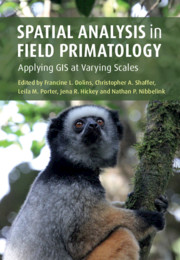Book contents
- Spatial Analysis in Field Primatology
- Spatial Analysis in Field Primatology
- Copyright page
- Dedication
- Contents
- Contributors
- Acknowledgments
- 1 Why Place Matters, and its Use in Primate Behavioral and Ecological Research
- Part I GPS for Primatologists
- Part II GIS Analysis in Fine-Scale Space
- Introduction
- 7 Home Range Analysis
- 8 Quantifying Resource Dispersion in Free-Ranging Bearded Sakis in Guyana
- 9 Interpreting Small-Scale Patterns of Ranging by Primates
- 10 Determining the Presence of Habitual Travel Route Networks in Orangutans (Pongo pygmaeus morio) in Kutai National Park, Borneo
- 11 Finding Fruit in a Tropical Rainforest
- 12 Random Walk Analyses in Primates
- 13 The Use of Small-Scale Spatial Analysis to Evaluate Primate Behavior and Welfare in Captive Settings
- 14 The Promise of Spatially Explicit Agent-Based Models for Primatology Research
- Part III GIS Analysis in Broad-Scale Space
- Index
- Plate Section (PDF Only)
Introduction
from Part II - GIS Analysis in Fine-Scale Space
Published online by Cambridge University Press: 29 January 2021
- Spatial Analysis in Field Primatology
- Spatial Analysis in Field Primatology
- Copyright page
- Dedication
- Contents
- Contributors
- Acknowledgments
- 1 Why Place Matters, and its Use in Primate Behavioral and Ecological Research
- Part I GPS for Primatologists
- Part II GIS Analysis in Fine-Scale Space
- Introduction
- 7 Home Range Analysis
- 8 Quantifying Resource Dispersion in Free-Ranging Bearded Sakis in Guyana
- 9 Interpreting Small-Scale Patterns of Ranging by Primates
- 10 Determining the Presence of Habitual Travel Route Networks in Orangutans (Pongo pygmaeus morio) in Kutai National Park, Borneo
- 11 Finding Fruit in a Tropical Rainforest
- 12 Random Walk Analyses in Primates
- 13 The Use of Small-Scale Spatial Analysis to Evaluate Primate Behavior and Welfare in Captive Settings
- 14 The Promise of Spatially Explicit Agent-Based Models for Primatology Research
- Part III GIS Analysis in Broad-Scale Space
- Index
- Plate Section (PDF Only)
Summary
The chapters in Part II are intended to provide readers with examples of methods for using GIS to answer fine-scale questions in primate behavioral ecology. Much of the GIS analysis in the primate literature has focused on broad-scale geographic questions (i.e., habitat suitability for a particular primate species), with fine-scale analyses often restricted to home range analysis or daily path lengths. However, the increased accuracy, portability, and affordability of GPS in the past decade, particularly for use on collars (see Chapters 7 and 8), has greatly expanded the types of fine-scale questions that can be addressed with spatial analysis. Further, advances in remote sensing technology, including satellite imagery and LIDAR, have made extremely high-resolution topographical and habitat data much easier to obtain for primate studies. Unfortunately, primatologists are often unsure of how to maximize this technology in their research.
Information
- Type
- Chapter
- Information
- Spatial Analysis in Field PrimatologyApplying GIS at Varying Scales, pp. 123 - 128Publisher: Cambridge University PressPrint publication year: 2021
